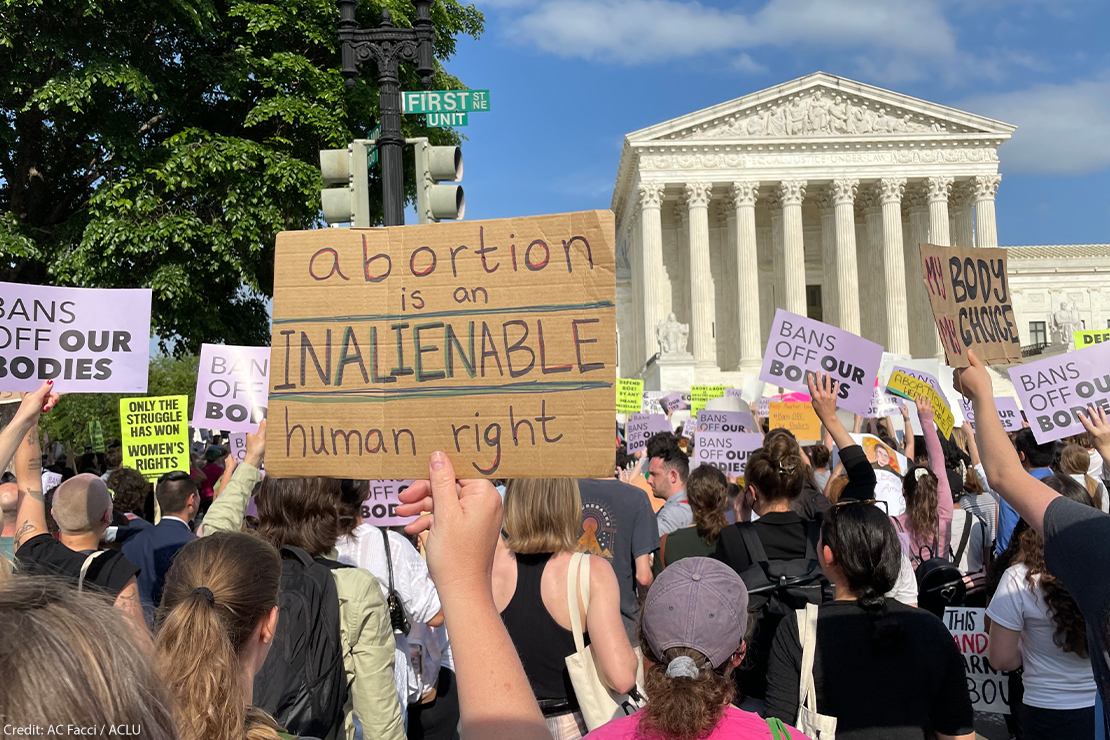Reproductive rights are under attack like never before across the country, with devastating consequences for pregnant people, especially those who are not able to afford to travel in search of essential health care they need. Fortunately, New Mexico has a long tradition of respecting reproductive health decisions, and our state laws are among the best in the nation when it comes to protecting access to abortion.
Q: Can you tell us what’s going on with reproductive rights?
Dakota Waterson (DW): 2022 has already been a tough year for reproductive rights in the U.S. We have seen a record-breaking number of harmful abortion bans being introduced and passed. The future of abortion rights, and all reproductive rights, are at risk in the Supreme Court this spring.
As of March 31, 1,884 pieces of legislation around abortion have been introduced across the country. This includes some proactive legislation, but it is mostly made up of harmful measures and abortion bans.
This is a crucial moment for our rights and there is no time to lose. The movement has been working tirelessly to fight back against all the attacks and work towards living in a world where reproductive justice values are a reality.
New Mexico has a proud history of protecting and expanding access to reproductive healthcare, but we are also continually working to expand access to comprehensive and medically accurate sexual and reproductive health education, contraception, pregnancy, prenatal healthcare, and gender affirming care.
Q: How does what’s happening in neighboring states affect New Mexico?
DW: New Mexico abortion clinics have seen a massive increase in patients coming from a wide variety of neighboring states and states across the country to receive reproductive healthcare.
Since Texas passed the horrendous SB8, almost all people seeking abortion care have had to travel to surrounding states such as Colorado, Oklahoma, and New Mexico. Texas Policy Evaluation Project stated that 27 percent of Texans seeking abortion care traveled to New Mexico between September and December of 2021. This study also states that 45 percent of Texans seeking abortion care traveled to Oklahoma to receive care. Now that Oklahoma has passed its newest abortion ban, Texans who were traveling to Oklahoma as well as Oklahomans will have to travel even further to states like New Mexico.
More patients coming to our state has led to increased waiting times for New Mexicans seeking abortion and reproductive health care access. Our clinics have had to expand their hours of service and hire more staff to meet the demand.
Abortion funds in New Mexico have seen an influx of applications and people seeking help paying for their abortions, their travel, hotel rooms, and childcare.
New Mexico does not currently have harmful barriers like our neighboring states, which means our health care providers continue to be able to show up and provide high-quality care to our communities and our neighbors.
Q: What are some good things happening in New Mexico to protect reproductive rights?
DW: I’m really excited to answer this question. New Mexico has been passing proactive reproductive health, rights, and justice legislation for years.
In 2019 we worked on passing the Health Coverage for Contraception bill, which increased access to contraception for New Mexicans, which means no co-pays for contraception under the Affordable Care Act and allows for 6 months of contraception at one time. It covers hormonal contraception as well as vasectomies and condoms.
In 2020 we worked on passing the Pregnant Worker Accommodation Act which guarantees protections for pregnant workers including the right to reasonable accommodations.
In 2021, we repealed an outdated pre-Roe abortion ban that made abortion illegal in the state, protecting access in New Mexico if and when Roe is overturned.
And in 2022 we worked on removing the gross receipt tax on menstrual hygiene products. So as of July 1, New Mexicans will no longer have to pay taxes on menstrual products such as pads, tampons, and period cups. We also expanded pregnancy-related Medicaid which now covers postpartum care for a full year, from 60 days previously.
Q: While there is so much great work happening in New Mexico to protect and expand reproductive rights, it’s hard watching our neighbors in other states having to fight so hard. What can we do? How can we help?
DW: Great question. Watching what’s happening in the country makes me extremely motivated.
Some ways for people to help are to get involved with organizations like the ACLU, Planned Parenthood, Bold Futures, we have so many wonderful local organizations at the forefront of this fight. Attend events that these organizations are hosting and continue to educate yourself about what’s happening.
The next thing is to vote! Find out where legislators stand on issues important to you. If you don’t like how they voted on reproductive issues, vote them out. And, lastly, if you can, donate to abortion funds. These funds have always needed support, but they need us now more than ever before.

